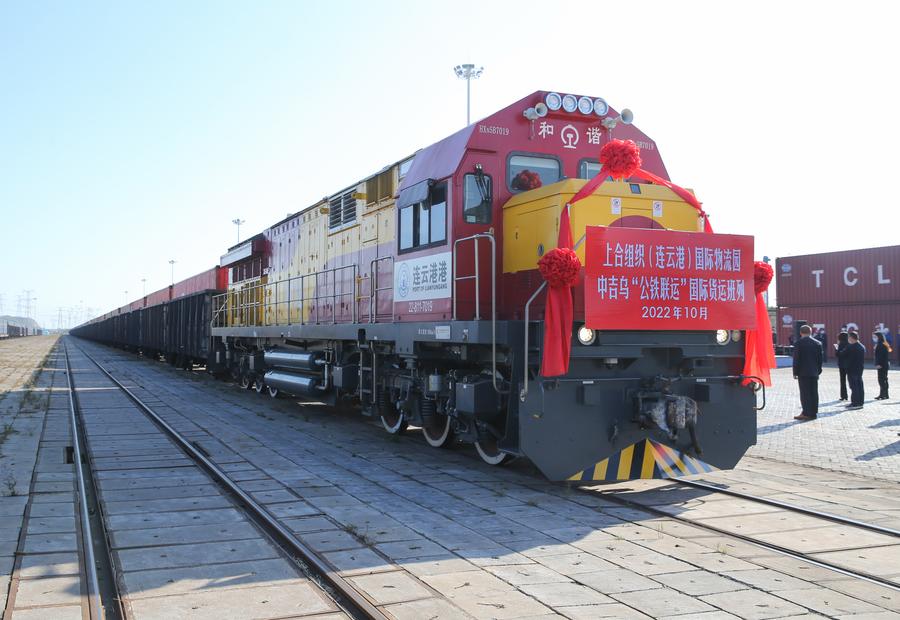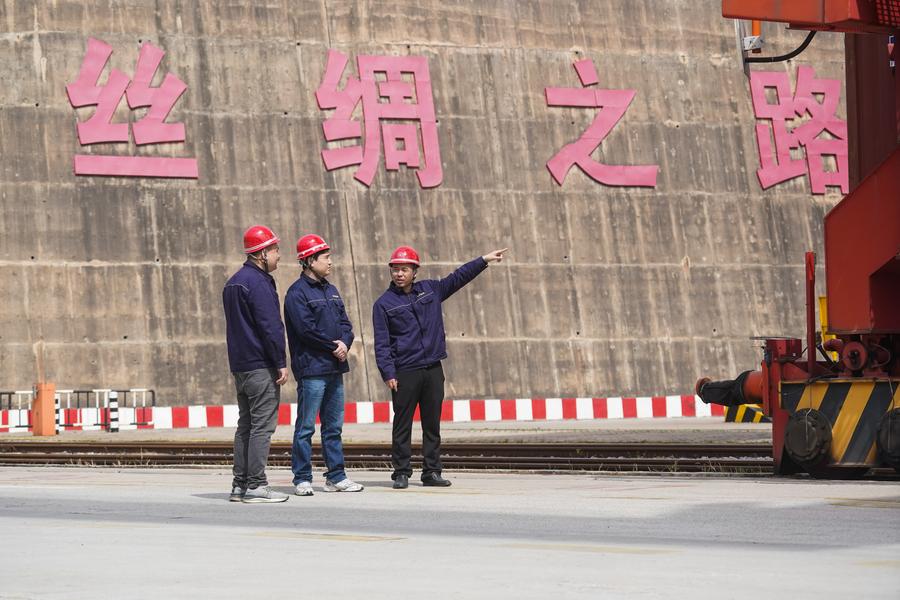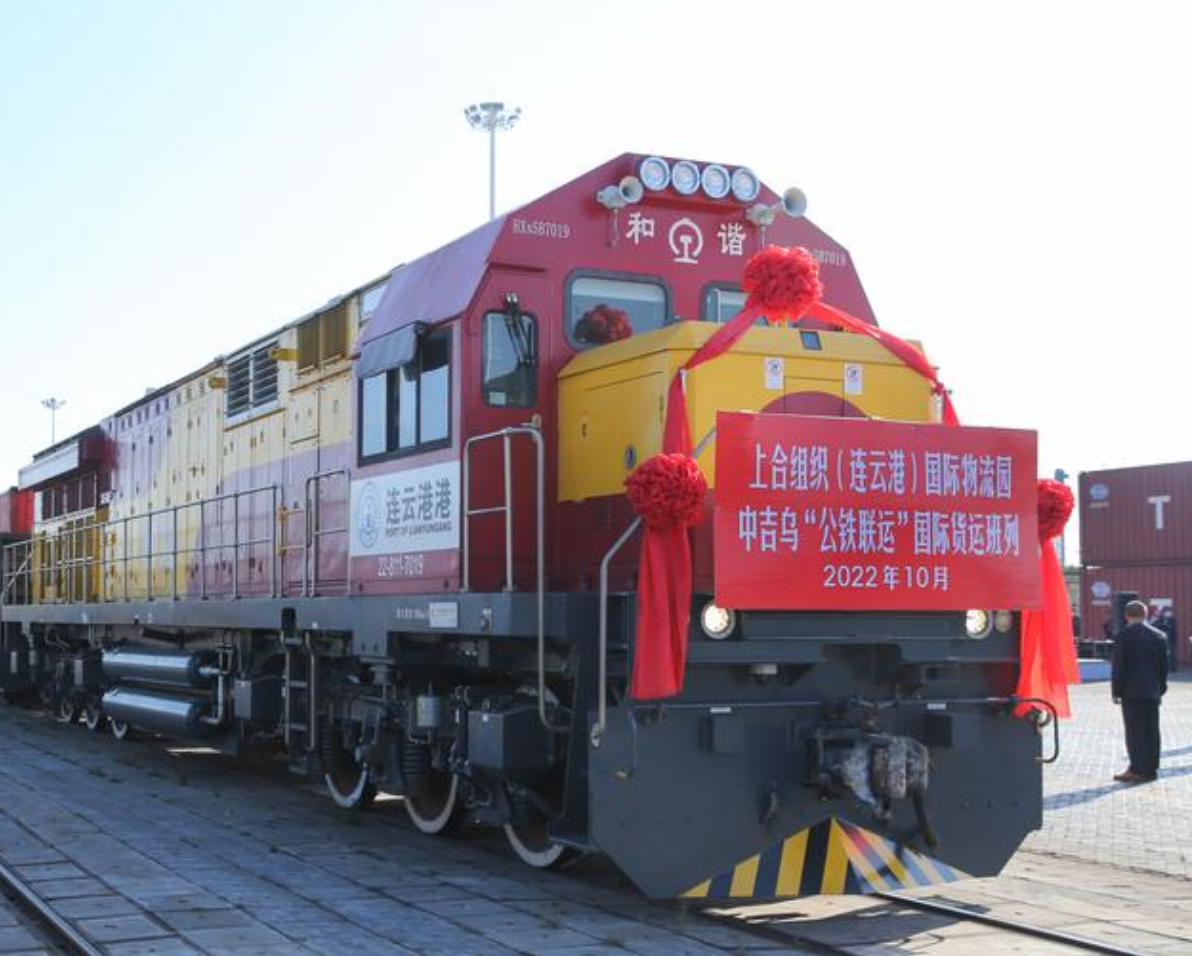This file photo taken on Oct. 13, 2022 shows an international freight train about to depart from the SCO (Lianyungang) International Logistics Park in Lianyungang City, east China's Jiangsu Province. (Photo by Wang Jianmin/Xinhua)
The Uzbek expert believed the political dialogue at the summit is conducive to discussing and addressing common challenges such as terrorism, extremism, drug trafficking, potential conflicts in the region, the development of joint economic projects and initiatives, as well as issues of cultural and humanitarian cooperation.
TASHKENT, July 8 (Xinhua) -- The just-concluded summit of the Shanghai Cooperation Organization (SCO) has opened a new chapter in strengthening cooperation between China and Central Asian countries, including Uzbekistan, an Uzbek expert has said.
"Intensive communication between China and Central Asian countries sends several key and multi-purpose signals at the international level," Azamat Seitov, a scholar of Uzbekistan's University of World Economy and Diplomacy, said in a recent interview with Xinhua.
The active interaction between China and Central Asian countries within the framework of the Belt and Road Initiative (BRI), efforts to strengthen multifaceted cooperation, joint efforts to combat terrorism, extremism and separatism, and the interaction in defense and security have all indicated the further formation of stable partnerships, positively impacting the efforts in supporting regional stability and security, said the expert.
The Uzbek expert believed the political dialogue at the summit is conducive to discussing and addressing common challenges such as terrorism, extremism, drug trafficking, potential conflicts in the region, the development of joint economic projects and initiatives, as well as issues of cultural and humanitarian cooperation.
"Most importantly, the meetings of leaders at SCO summits contribute to closer political interaction and coordination, help to better understand each other's positions and interests, which promotes quality dialogue and strengthens trust" within the SCO framework, Seitov said.
Seitov noted that the SCO has transformed from a regional forum into an important player on the international stage, actively influencing global security and stability.
Over the past years, the organization has actively developed its mechanisms and strategies to combat terrorism, extremism and separatism. An important step was the establishment of the SCO Regional Anti-Terrorist Structure (RATS) in Tashkent, which coordinates the efforts of member countries to combat these threats, said the expert.
"Notably, the SCO is adapting its activities to new challenges, such as cybersecurity and climate change. This makes the organization more flexible and capable of effectively responding to modern threats," he said.
Noting the positive role of the SCO in improving the security situation in Central Asia over the past two decades, Seitov highlighted the significant role played by the SCO RATS in coordinating the efforts of member countries in information exchange, joint anti-terrorist exercises and operations against extremist groups.
Another important aspect is the exchange of experience and best practices in law enforcement, which encompasses training programs, staff exchanges and technical assistance among member countries, said the expert.
"In enhancing security in Central Asia within the framework of the SCO, China undoubtedly plays an important and leading role. Chinese initiatives and its active participation in their implementation contribute to strengthening stability, economic development and reducing security threats in the region," said Seitov.
Chinese and Kazakhstan staff members communicate at the China-Kazakhstan (Lianyungang) Logistics Cooperation Base in Lianyungang, east China's Jiangsu Province, May 10, 2023. Launched in May 2014, the China-Kazakhstan (Lianyungang) Logistics Cooperation Base is the first entity project inaugurated under the Belt and Road Initiative. (Xinhua/Ji Chunpeng)
The BRI, in particular, has opened up new opportunities for improving transport infrastructure, developing energy, reducing customs barriers, simplifying procedures and attracting investment in Central Asian countries, as well as contributing to the development of cultural and humanitarian ties, and enhancing mutual understanding and trust among people within the SCO, Seitov added.






 A single purchase
A single purchase









